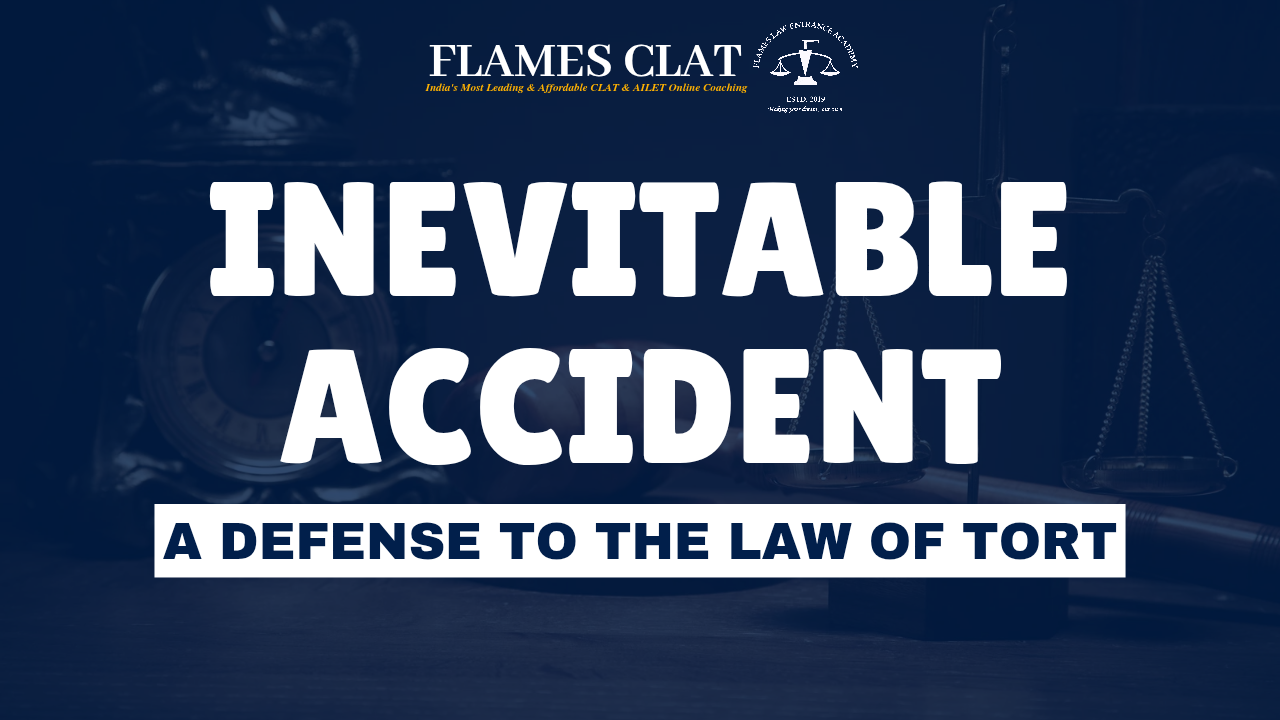Inevitable Accident: A Defense to the Law of Tort
A tort is a civil wrong caused by infringement of a right in rem by any person, resulting in compensation for the liability. It includes trespass, battery, negligence, defamation, vicarious liability, strict and absolute liability, etc. These liabilities also have certain exceptions, and one of them is an inevitable accident. At Flames CLAT Academy, where future legal professionals are trained to think critically and interpret evolving laws, such provisions are frequently discussed and debated in classes and workshops to nurture socially aware legal minds. This blog aims to explore the inevitable accident as a defense under the law of tort.
What is an Inevitable Accident?
Inevitable means something that cannot be avoided or terminated. No matter how reasonable precautions are taken, something inevitable cannot be averted. An accident is an unexpected event that causes harm and injury. Under the Law of Tort, it is considered a defense and not just an accident.
Inevitable Accident means that a person cannot be held liable for an accident that was not foreseeable and reasonable precautions were taken. According to the law, the degree of precaution does not matter when reasonable precautions are taken.
While classifying something as an inevitable accident, it is essential to consider whether there was a scope of care and it was taken care of by the defendant, and whether there was any negligence committed during the precautions. The onus is on the defendant to prove that all due care and precautions were taken, and the particular event was unavoidable from happening.
Essentials of Inevitable Accidents
While using this doctrine, the defendant has to fulfil the following essential criteria:
- There has to be an accident, which is an unexpected event.
- The accident should be unavoidable, even if a person utilizes all their possible skills, precautions, and care.
- The consequence of this inevitable accident should be damage, suffering, loss, injury, or harm.
How are Accidents and Negligence related?
Negligence is the breach of duty by the defendant that causes harm or injury to the plaintiff. In this case the onus is on the plaintiff to prove that there exists a duty of care and it was breached by the plaintiff resulting into injury or damage.
Inevitable accident on the other hand is an exception to the tort of negligence. The onus lies on the defendant to prove that accident was unforeseeable and due care was taken by him.
Their relation is established by thin distinction in the duty of care taken by defendant for an act leading to damage.
How is Accident related to Act of God?
Act of God means the actions that are beyond human control i.e. natural calamities like earthquake, flood, landslide, etc. When loss is due to this, no one is held liable.
This concept is similar to inevitable accident. In both, the defendant is excused of the liability of his acts due to circumstances beyond his control.
Inevitable accident occurs to legitimate actions for which due precaution is taken, if not, it results in negligence but in act of god, by no way can the defendant be held liable for negligence, as act of god does not result from human actions.
Types of Inevitable Accident
Thus, we generally see two types of inevitable accident.
- Accident due to forces beyond human power, and
- Accident caused partially or completely due to human intervention.
Exceptions to the defence of inevitable accident
Certain instances when the defendant is unable to use the defense of inevitable accident are as follows:
- Strict & Absolute Liability – when a dangerous thing escapes causing damage to the plaintiff, defendant or organisation/company is strictly held liable and cannot avail the defense of inevitable action as any situation that causes serious harm cannot be averred by due and reasonable care.
- Trespass – A defendant cannot take the defense of inevitable accident as the onus in such cases is on the plaintiff to prove that the stranger interfered with their land and on the defendant.
Few Landmark Cases
- Holmes v. Mather, 1875
- Brown v. Kendal, 1850
- Nitro-Glycerine Case, 1872
- Padmavati v. Dugganika, 1975
- Shridhar Tiwari v. U.P. State Road Transport Corporation, 1986
- S. Vedantacharya v. Highways Department of South Arcot, 1987
Conclusion
Thus, inevitable accident, a defense under the law of tort for acts causing damage is a relief for defendants when the action is not in their hand or caused due to act of god. Legal educators at Flames CLAT Academy continue to emphasize such debates and discussions as essential for aspirants preparing for CLAT and judiciary exams, where understanding the concepts of Tort and their exceptions are not just academic goals but tools for real-world impact.
Join our Flames CLAT Family at https://t.me/flamesclat
For Informative videos, do check out https://youtube.com/@flamesclat?si=-PqiaRLEjutM-iYj




Write a Review
Your email address will not be published. Required fields are marked *